The horrors of Bucha: mass graves, bodies ‘left to rot in bags like rubbish’ and the 89-year-old shot dead in bed
As residents attempt to pick up the pieces of their devastated city after Russia’s retreat, they tell Kim Sengupta of witnessing atrocities worse than ‘anyone could even imagine’

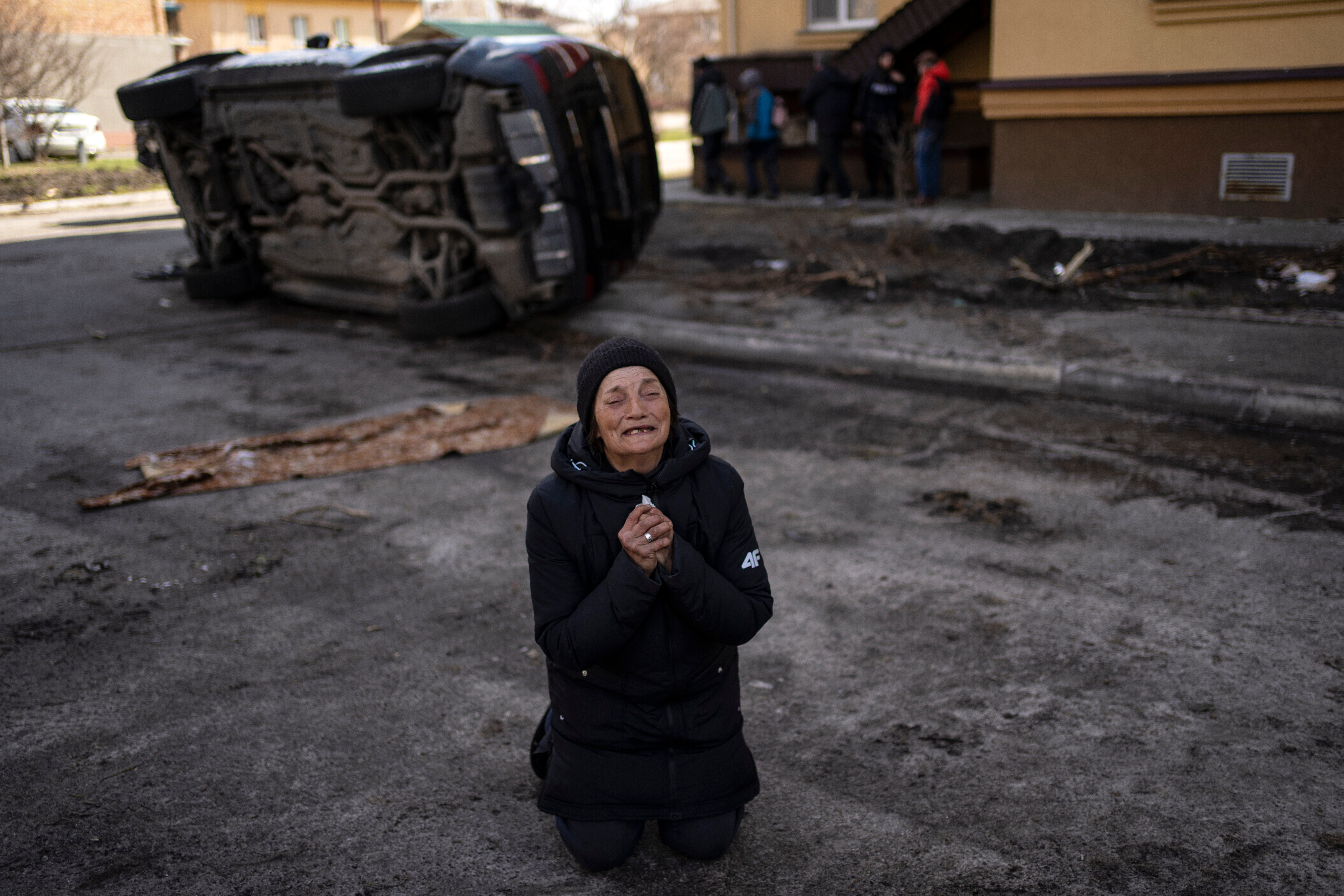
Vokzalnaya, a road running from the railway station to the town centre, is a shocking example of how Bucha has turned into a grim symbol of the violence and brutality of the Ukraine war.
Three-quarters of the street is filled with the charred skeletons of Russian tanks torn apart by Ukrainian missiles. Every house on either side has been damaged, some by pieces of flying armour that lie in gardens or have become embedded in walls.
On the small stretch beyond where the last tank was halted are fragments of bones and gore, from civilians who had been killed by the Russians and their bodies then abandoned for weeks.
“They were left to rot after they died, as if they were bags of rubbish,” said Dimitrou Zamohylny, a Bucha resident. “In that time flocks of crows sat on the bodies, pecking out and eating eyes. I had never thought I would see anything like that happening, actually happening near my own house. How could anyone even imagine something so bad, in an ordinary place like this.”
But Bucha is no longer just “an ordinary place”. This city to the northwest of Kyiv, with a population of 36,971 in the last census, is now in international focus for appalling reasons: the massacre of hundreds of its people – women, children and men, young and old – for which there are calls for Vladimir Putin to be tried for war crimes.
The Russians have withdrawn from Bucha, as they had done from a swathe of towns, from where they were supposed to launch a pulverising assault for what is said to have been Mr Putin’s fundamental aim – the capture of the Kyiv and the instalment of a regime more amenable to Moscow.
The Ukrainian president, who has survived attempts to remove him, including by attempted assassinations, came to Bucha on Monday accompanied by coach loads of media. He wanted to show what he has described as “genocide”, mass killings which have been replicated in other villages, towns and cities under Russian occupation.
“We know of thousands of people killed and tortured, with severed limbs, raped women and murdered children … dead people have been found in barrels, basements, strangled, tortured”, said Volodymyr Zelensky, wearing a flak jacket.
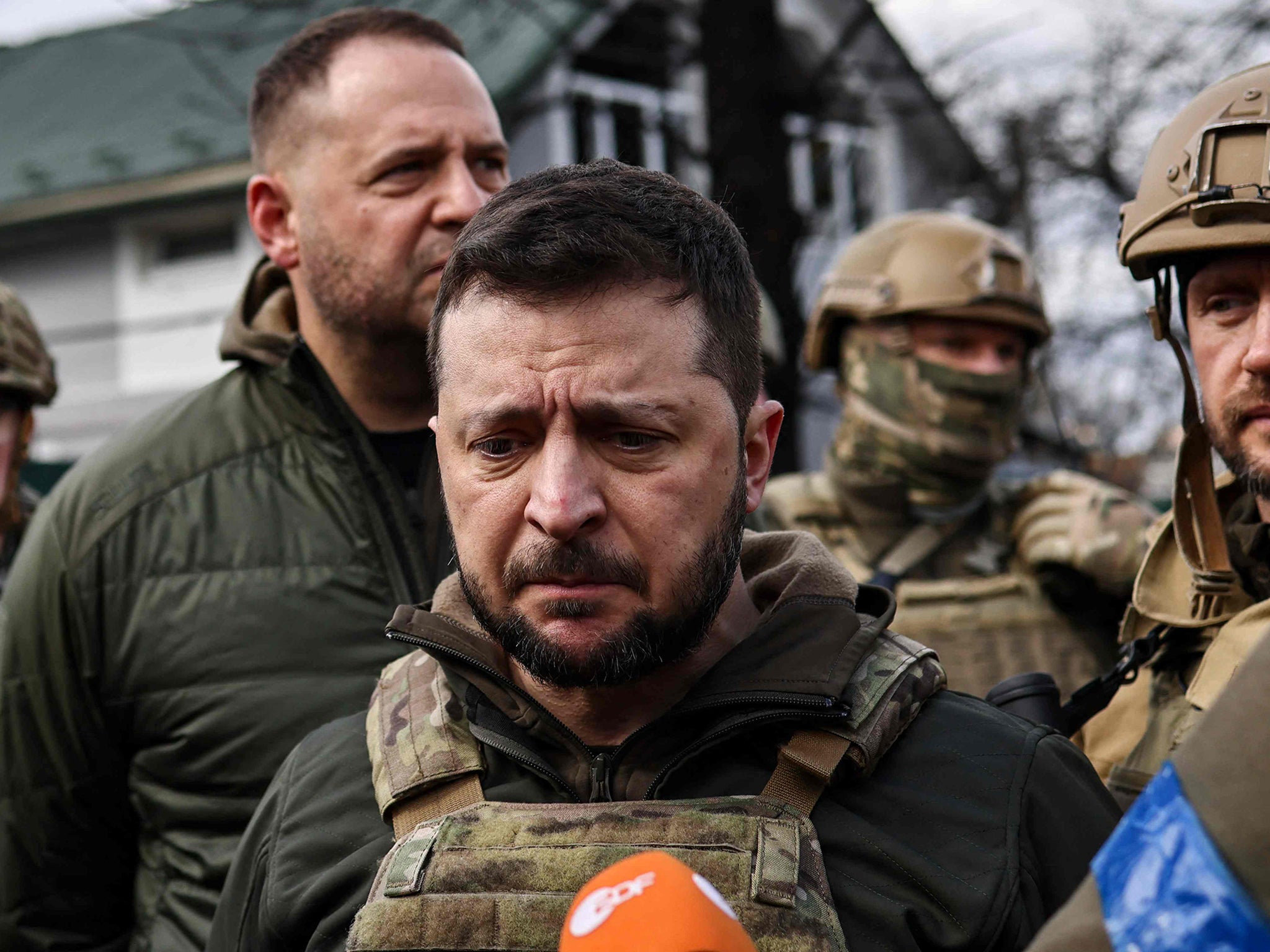
But Mr Zelensky is still prepared to negotiate with those who have inflicted such suffering. “It’s very difficult to talk when you see what they have done here”, he acknowledged, while asking for the talks to be accelerated. “The longer the Russian Federation drags out the meeting process, the worse it is for them, for this situation and for this war.”
The president, his entourage and the attendant media left. The people of Bucha went back to trying to pick up the pieces, queueing up for food deliveries, trying make damaged homes habitable, visiting the wounded in hospitals, seeking family members and friends who have disappeared, and getting on with their lives as best they can.
The dead, some with their hands tied behind their backs, some hooded, some shot in the back of the head, are being taken away from the gouged and blackened streets by Ukrainian troops and volunteers.
The Russians appear to have put many of those killed into mass graves. The largest one is behind the Church of St Andrew and Pyervozvannoho All Saints, where the estimates of numbers buried range from 60 to about 320 or even more.
Mounds of brown earth are piled up over a pit 45ft long into which corpses in black plastic bags have been flung. Some of the bags have split, with legs and arms protruding. Limbs have broken free among the buried, rising up from the soil; one palm is cupped as if in supplication.
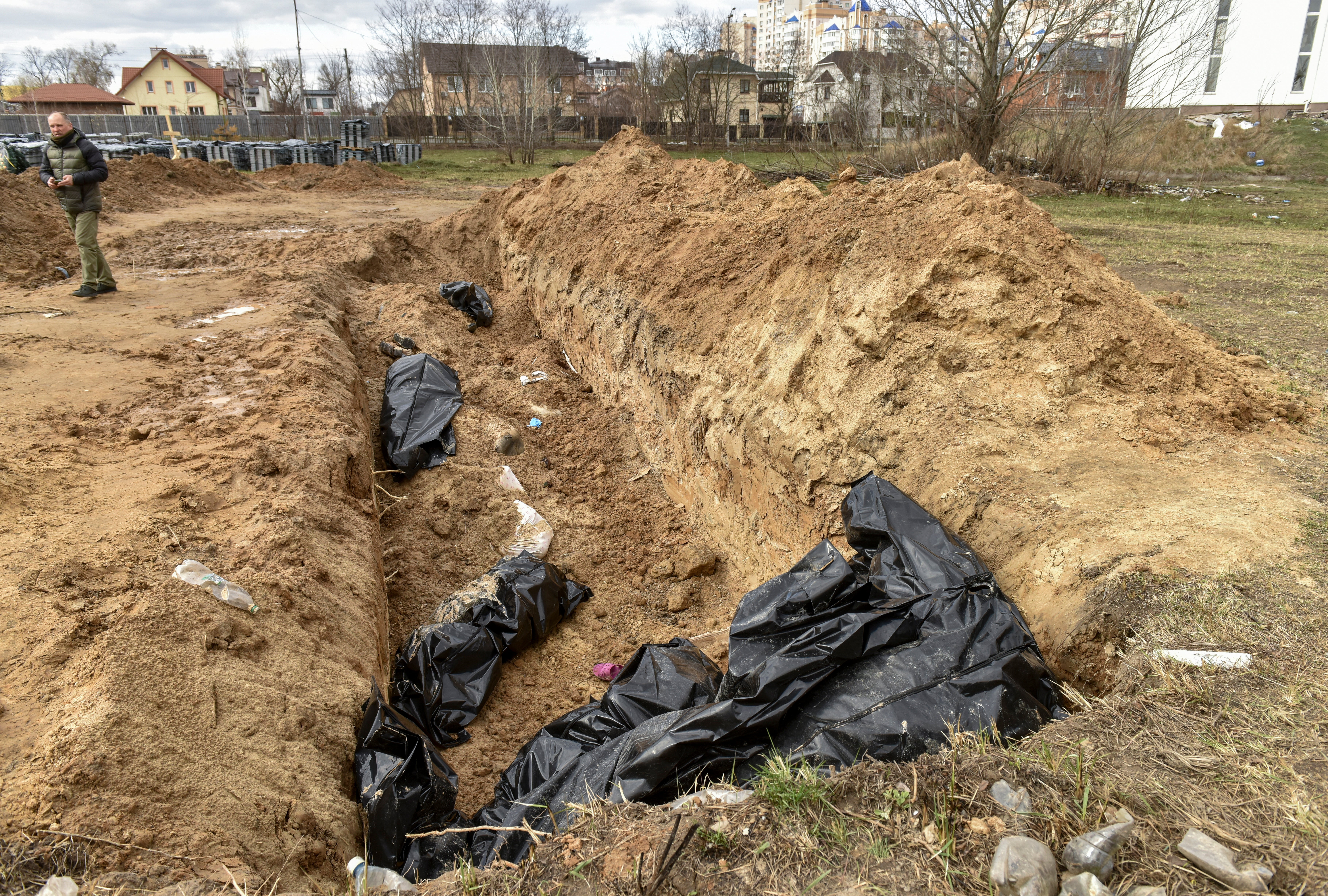
There was another grave in woodlands 18 miles west of the city. Among the bodies found there was that of Olga Sukhenko, the mayor of the nearby town of Motyzhyn, alongside her husband and son. Her fingers and arms were found to have been broken, according to the mayor of the neighbouring town, Kopyliv.
There are still bodies left in houses. One is that of 89-year-old Alla Minorava, found lying on her bed with bloodstains on her arms. She had died on 25 March. Russian soldiers who had taken over her house told neighbours they had shot her.
“They did not say why they had shot her. It is difficult to think of a reason, she was an old woman, she was hardly a threat to them,” said Sergei Malyk. “A lot of the killings here make no sense, they killed other old people like her, and young boys and girls.”
Ms Minorava’s grandchildren were among members of the family who hid in a basement while the Russians ransacked the place. Goods from the house, including a washing machine, were stolen, and others, including a television set, were smashed.
“Those hiding in the basement, especially the children, were terrified. They could hear the Russians getting drunk, smashing the place up above them,” said Mr Malyk. “But at least they did not die like poor Alla.”
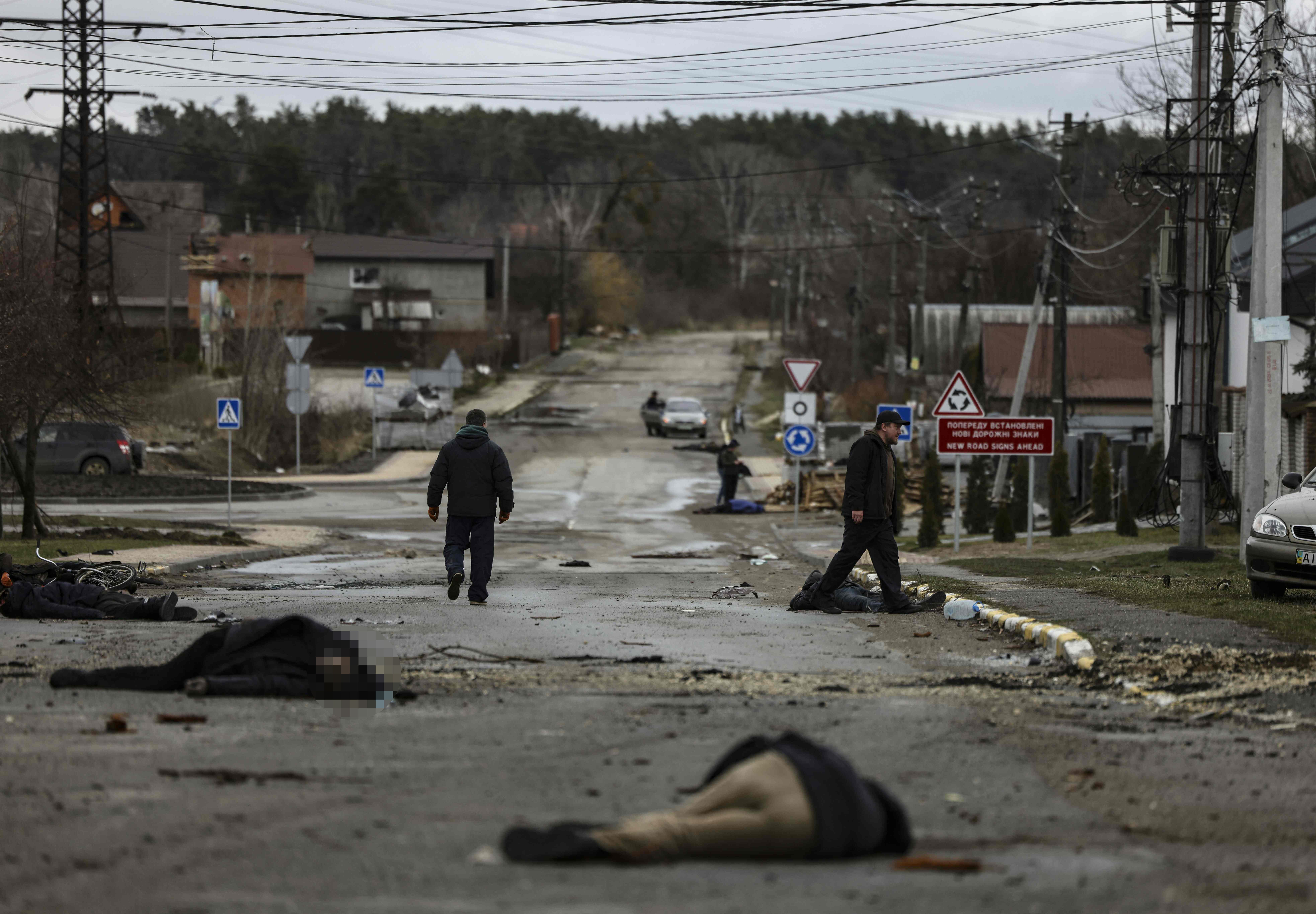
Sergei Simolenskiy, 50, is convinced the only reason he survived was because of his tattoo. “They arrested me a few times. One time they had me standing for over three hours with my hands against the wall,” he said.
“At the end they had a gun in the back of my head, I could hear the click of the safety coming off and knew they were going to shoot. Then they saw my tattoo and realised I used to be a marine and they let me go.”
Mr Simolenskiy served in the Soviet forces in the early 1990s and was deployed in the war in Georgia. Now he says he feels nothing but anger against the Russian troops in Ukraine.
“We all know Putin is behind this disaster. The Russian soldiers told me that they were following orders, but they are soldiers, they know what is a war crime.
“They have done some terrible things. I have seen them arrest people, tie them up and shoot them in the head. How many did they kill? I would say around 600 or 700. They left the bodies in the streets, I saw a dog eating a man’s head one day. There are lots of dogs on the street because their owners have left or have gone missing. Some of these dogs have become vicious, they run around in packs, they have attacked kids.”
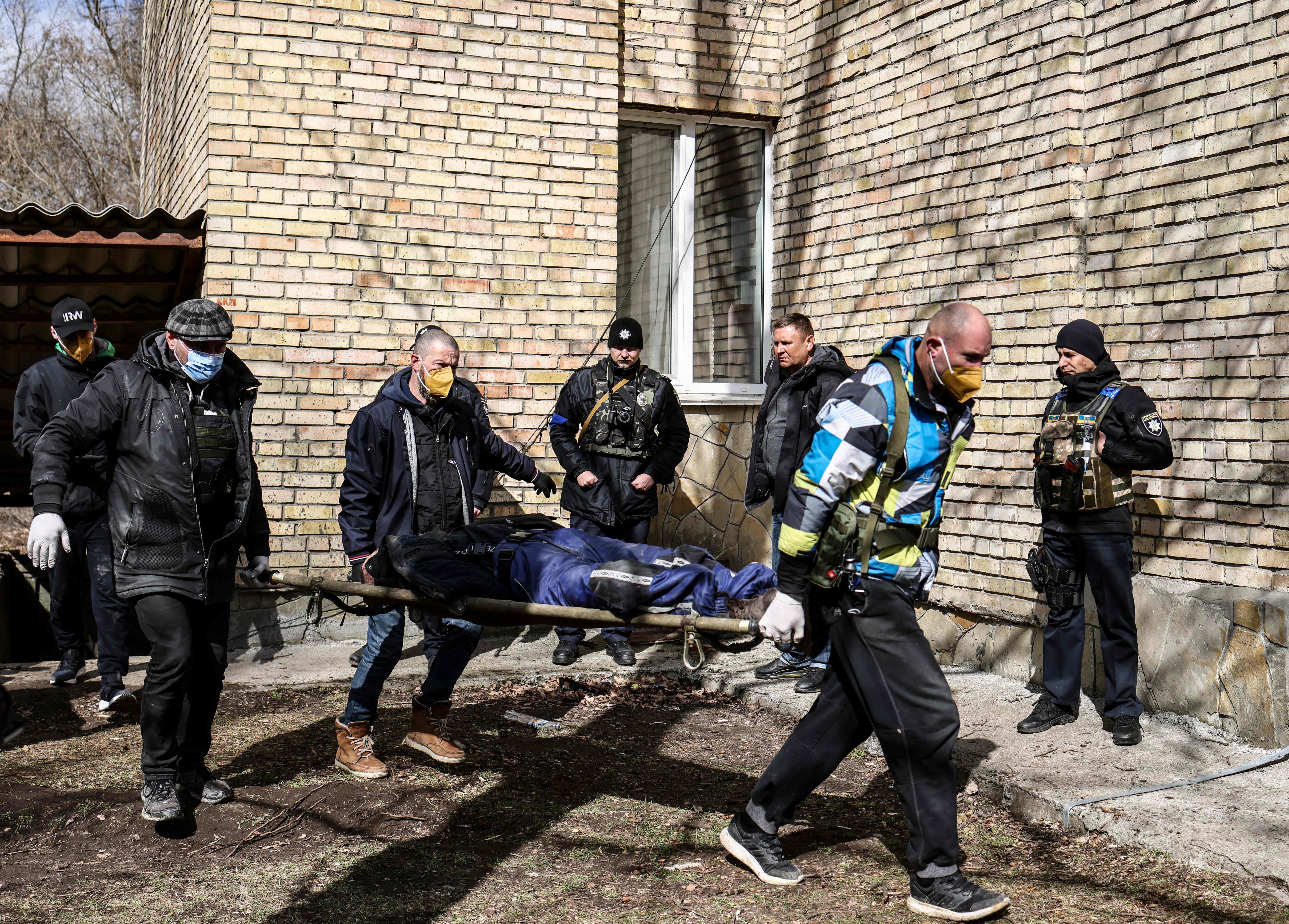
Natalya Yakovenka was a solitary figure standing on the pavement gazing at a house. It belonged to her brother, Artem, who is missing. “He had sent his family away and he was living by himself,” she said. “We heard that the Russians had taken him away because he used to be in the Ukrainian army in the past. But he is disabled, he couldn’t fight any more. I heard they may have found a body, but where? Is it in a mortuary, in a grave?”
Serhiy Kaplinsky, a Bucha coroner, said he and his colleagues had collected around 100 corpses so far. He had buried around 60 bodies in the cemetery before he fled the city on 8 March after hearing Russians were rounding up local officials. Fifteen had died of natural causes, he reported, and the rest had shrapnel injuries or had been killed by gunshots, including at close range.
Andriy Klionchonduk was shot in the leg during the fighting on Vokzalnaya.
“There was so much shellfire, so many rockets that I did not even hear the gunshot,” he said. “But I felt sudden pain and then I felt wetness. It was my blood. That was on 27 February, when all these tanks were destroyed. A lot of Russians were killed on that day. I think they killed a lot of people in revenge for that down the street. They arrested many as well.”
The Ukrainian Ministry of Defence has issued photographs of what it says was a torture room in barracks used by the Russian forces. The bodies found there were kneeling when gunned down, and at least one had been shot through the knees before being executed, Kyiv’s military claimed.
The Russian troops had taken over the back rooms of looted shops for their quarters near the railway station. All that was left were mattresses on floors, with bedding taken from nearby houses – one blanket had the motif “I love New York”. Graffiti on the wall outside proclaimed “Russian strength”. A small field behind was littered with empty and broken alcohol bottles.
On the outskirts of Bucha lay another batch of Russian tanks which had been hit. Ukrainian soldiers were salvaging what they could from the wrecks. They were also taking out bodies, those of young men broken and burned beyond recognition, part of the lethal toll in the savage battle for Bucha.
Join our commenting forum
Join thought-provoking conversations, follow other Independent readers and see their replies
Comments
Bookmark popover
Removed from bookmarks